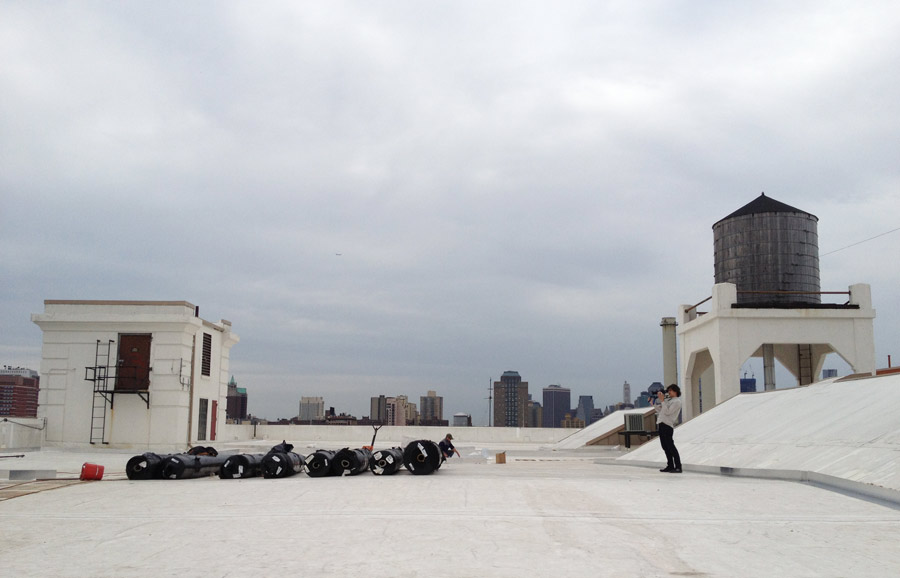Brooklyn Grange: A Portrait of Urban Farming
Three teasers from the upcoming documentary about Brooklyn’s biggest rooftop farm


Earlier this year the five core members of Brooklyn Grange, well known by now as the largest soil rooftop farm in the world, signed a 20-year lease for a 65,000-square-foot rooftop at the Brooklyn Navy Yards. In just two years they outgrew their 40,000-square-foot Queens location, which services a CSA membership, regular farmers’ markets as well as local restaurants like Roberta’s and Paulie Gee’s. Now, with more than two acres of fertile ground as well as chicken coops and a commercial apiary, Brooklyn Grange seems poised to conquer underutilized rooftops all over the city. But back in May, when the Navy Yards location had yet to be greenroofed and growing season was less than a month away, their future seemed uncertain. Could the Queens location do enough business to support their expansion while they struggled to prep the roof and plant the seedlings in time?
As they faced rainy days and a number of delays, no one was sure what might happen. Director and CH contributor Michael Tyburski and Group Theory producers Ben Nabors and Burke Cherrie knew that triumph or fail, it was not only a story worth telling, it was an important moment to document. During his first visit to the Navy Yards in May, Tyburski remembers standing on a completely barren rooftop that needed to be fully functional by the end of the month in order for the business to stay afloat, and wondering whether they were really going to pull it off. But the more he filmed the daily tasks involved in running a farm in the middle of a bustling city, the more he realized that the narrative of the documentary was less about whether or not Brooklyn Grange was going to succeed or fail, but about creating an honest portrait of the urban farmer.
Brooklyn Grange is run by head farmer Ben Flanner and four partners who see to the day-to-day operations of the growing business. Since May, Tyburski and his crew have filmed the greenroofing, planting and Monday morning business meetings at the Navy Yards, which Tyburski describes as “one of the most fascinating places [he’s] visited in New York. It’s a whole different world just beyond the gates off Flushing Avenue.” The former naval base was deactivated in 1966, but is now home to a growing community of new businesses. To get their operation up and running in under a month, Flanner and his fellow farmers worked from dawn to dusk for six to seven days a week. They labored constantly, even through downpours, stopping only to make ponchos from large trash bags and tie bodega bags over their heads.
Though you might be skeptical of a Brooklyn resident in his early 30s who calls himself a true farmer, Tyburski—who grew up in rural Vermont—said the only difference he saw between the farmers from his hometown and the Brooklyn Grange crew is that the latter have to parallel park their cars before going to work. There are other differences too, of course, ones that highlight what it means to be an urban farmer, specifically. One early morning the documentary crew went to Flanners’ Williamsburg apartment to pick up a gaggle of baby chicks he was nursing in a cardboard box in his closet. Those chicks now reside in a rooftop chicken coop with prime views of the East River. There are other moments, too, that can only happen on a farm located in the busiest city in the country. Yes, Bloomberg paid a visit, but the farm also plays host to a large and ambitious apiary that involves an apprenticeship system, and plans to breed a bee with heartier, city-strength DNA. They deal with very location-specific issues, like transporting a colony of rogue bees that started a hive in an old fire hydrant and rescuing the honeycombs.


Principle photography for the documentary has been completed and—spoiler alert—the Navy Yards farm was indeed humming along by June. Tyburski expects to complete the film by the end of the year. Visit Group Theory to follow the project or support the film, and if you’re in New York, see their stockists for places where you can buy raw honey or fresh vegetables grown by Brooklyn’s finest urban farmers.












